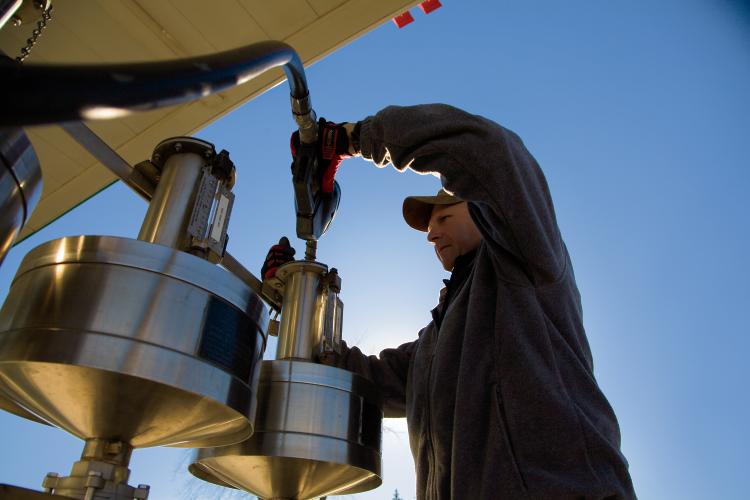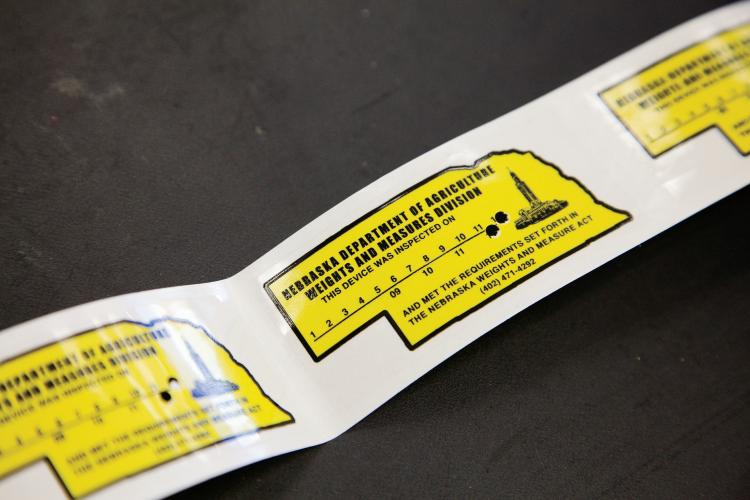Home > Nebraska > Nebraska Crops & Livestock > NDA Consumer Protection Division Enforces Retail Rules
NDA Consumer Protection Division Enforces Retail Rules

When you hand hard-earned cash to a retailer, you expect to get what you pay for. But how can you be sure you’re getting your money’s worth? Are you really getting a full gallon of gas or pound of apples? The Nebraska Department of Agriculture (NDA) works behind the scenes to protect you by ensuring fair exchanges for items sold by weight, measure or count.
NDA’s Food Safety and Consumer Protection Division enforces laws and regulations ensuring the accuracy of commercial transactions, using uniform standards to regulate purchases based on weight, measure or count. The division regularly inspects 42,000 commercial devices to protect consumers from fraud, inaccuracies and faulty measuring equipment.
“It’s about allowing the consumer to make a cost and quantity comparison so they know what the best deal is and that they’re not getting short-changed,” Division Administrator Paul Moyer says.
The National Institute of Standards and Technology estimates that weights and measures rules influence about half of the U.S. gross domestic product.
“We’re out there inspecting all sorts of businesses,” Moyer says. “It might be companies selling anything from antifreeze to ice cream.”
Packaging and Labeling
Products sold by weight, measure or count must comply with state statutes. Store checkout scales as well as the software systems they utilize are inspected for accuracy to ensure the packaging material is not charged as part of the product weight. For example, when a customer purchases a pound of apples, the software system should deduct the weight of the plastic bag the apples were placed in; this is referred to as the tare weight. Another example would be when purchasing ground bulk coffee. The system should deduct the tare weight (for the bag) to assure the consumer is not being charged for the weight of the bag, potentially preventing the consumer from being overcharged 30 cents or more (based on the price of coffee per pound).
The NDA Food Safety and Consumer Protection Division also enforces proper packaging and labeling on prepackaged items.
A prepackaged item must contain at least the net weight shown on the label. This protects consumers from paying for packaging materials. NDA officials conduct random inspections of more than 75,000 packaged products each year.

Full Compliance Required
Whether making purchases from a farmers’ market, grocery store or a gas station, consumers can trust the product they buy is weighed, measured and sold in conformity to state and federal regulations. NDA has the ability to check scales with capacities ranging from a hundredth of a gram to 500,000 pounds.
“We check all commercial devices annually, which is required by law,” Moyer says. “If a device is found to be out of compliance for any reason, our inspector will place a colored tag on the device. That tag will only be removed once the device is brought back into compliance. A follow up inspection will be conducted to ensure it meets all regulations.”
According to Moyer, officials discover issues with 8 to 10 percent of inspected devices with only about 4 percent of the problems affecting accuracy. The other 4 to 6 percent relate to labeling and other issues. Enforcing accuracy in commercial transactions serves the interests of consumers, as well as the business.
“The inspections we conduct help ensure that the consumer is getting what they are paying for, but it also helps make sure that the business is not being shortchanged either,” says Moyer. Businesses benefit from consumer confidence gained through oversight and are free from suspicion of fraudulence, even when consumers cannot visually inspect purchases, like gasoline.
Rising prices of all commodities are hard enough to absorb, let alone dealing with a malfunctioning device. NDA-inspected gas pumps receive a yellow, Nebraska-shaped sticker with the inspection date clearly marked. The sticker signifies the device is functioning properly and that the consumer may expect a fair transaction.
“It benefits petroleum marketers from a competitive standpoint. Consumers are getting what they pay for, and the retailer is on a level playing field,” Timothy Keigher says. Keigher is executive director of Nebraska Petroleum Marketers and Convenience Store Association, a non-profit trade organization.



